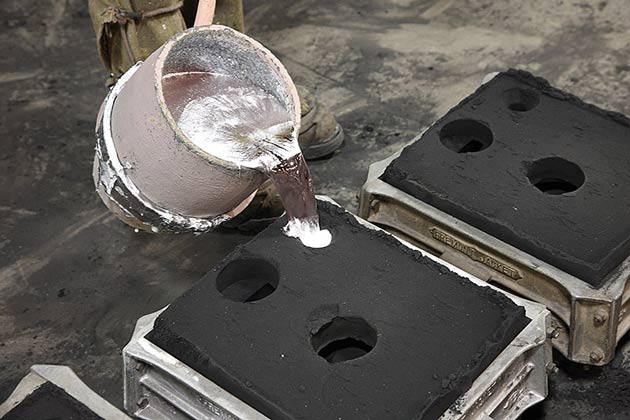The Definitive Guide to Alcast Company
Table of ContentsAlcast Company Things To Know Before You Get ThisAlcast Company Fundamentals ExplainedExcitement About Alcast CompanyThe Basic Principles Of Alcast Company Getting My Alcast Company To WorkAlcast Company for Dummies
The subtle difference lies in the chemical content. Chemical Contrast of Cast Aluminum Alloys Silicon promotes castability by lowering the alloy's melting temperature level and boosting fluidity throughout spreading. It plays a crucial duty in permitting complex mold and mildews to be loaded properly. Furthermore, silicon adds to the alloy's strength and wear resistance, making it beneficial in applications where toughness is crucial, such as auto components and engine parts.It also boosts the machinability of the alloy, making it less complicated to process right into finished products. In this way, iron contributes to the total workability of light weight aluminum alloys.
Manganese contributes to the stamina of aluminum alloys and enhances workability. Magnesium is a lightweight element that provides stamina and impact resistance to light weight aluminum alloys.
The Best Guide To Alcast Company
Zinc enhances the castability of light weight aluminum alloys and assists regulate the solidification process during casting. It boosts the alloy's toughness and hardness.

The primary thermal conductivity, tensile toughness, yield stamina, and prolongation differ. Select ideal raw products according to the performance of the target item produced. Among the above alloys, A356 has the greatest thermal conductivity, and A380 and ADC12 have the most affordable. The tensile limit is the opposite. A360 has the most effective return toughness and the highest possible prolongation price.
Rumored Buzz on Alcast Company

In precision spreading, 6063 is fit for applications where complex geometries and high-quality surface area finishes are extremely important. Examples include telecommunication units, where the alloy's exceptional formability permits smooth and cosmetically pleasing styles while preserving structural stability. In the Lights Solutions sector, precision-cast 6063 components develop elegant and effective lights fixtures that call for intricate forms and good thermal performance.
The A360 displays exceptional prolongation, making it excellent for complex and thin-walled components. In precision casting applications, A360 is fit for sectors such as Customer Electronic Devices, Telecommunication, and Power Tools.
The Ultimate Guide To Alcast Company
Its distinct buildings make A360 a valuable selection for precision spreading in these sectors, boosting item toughness and quality. Light weight aluminum alloy 380, or A380, is an extensively made use of spreading alloy with numerous Read Full Report distinctive features. It supplies exceptional castability, making it a perfect choice for precision spreading. A380 displays excellent fluidity when molten, making certain complex and in-depth mold and mildews are precisely replicated.
In accuracy casting, aluminum 413 beams in the Customer Electronic Devices and Power Tools industries. This alloy's exceptional rust resistance makes it a superb selection for outside applications, making sure lasting, long lasting items in the pointed out sectors.
The Best Strategy To Use For Alcast Company
The aluminum alloy you choose will substantially impact both the casting process and the buildings of the final item. Because of this, you have to make your decision thoroughly and take an enlightened strategy.
Identifying one of the most suitable aluminum alloy for your application will certainly suggest evaluating a broad range of features. These comparative alloy characteristics adhere to the North American Die Spreading Association's guidelines, and we have actually separated them into two classifications. The very first group addresses alloy characteristics that affect the production procedure. The 2nd covers attributes influencing the residential or commercial properties of the final item.
An Unbiased View of Alcast Company
The alloy you select for die casting straight influences numerous aspects of the casting procedure, like exactly how very easy the alloy is to deal with and if it is susceptible to casting flaws. Warm breaking, also referred to as solidification cracking, is a typical die spreading problem for aluminum alloys that can lead to inner or surface-level splits or fractures.
Specific light weight aluminum alloys are much more susceptible to hot splitting than others, and your selection should consider this. It can harm both the cast and the die, so you must look for alloys with high anti-soldering residential or commercial properties.
Corrosion resistance, which is currently a notable attribute of aluminum, can differ significantly from alloy to alloy and is an important characteristic to consider depending on the environmental problems your product will be revealed to (aluminum casting company). Put on resistance is an additional residential or commercial property typically looked for in light weight aluminum items and can separate some alloys